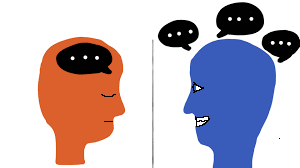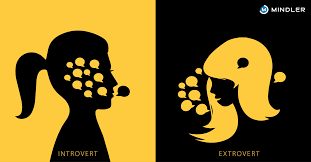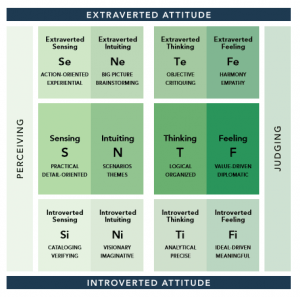E and I when Sheltering in Place
Quarantine orders and sheltering in place have led many teams to take their meetings online. As challenging as teamwork is when you can share the same physical space, it becomes even more of a trial when distance separates you. Let’s focus on one component of Psychological Type–Extraversion and Introversion–and see what tools we can glean from a deeper understanding of these preferences.
 Carl Jung suggested that just as we are each hard-wired with a preferred handedness, our brains were similarly wired for preferences for how we take in data and make decisions. Among these cognitive preferences is also rooted a tendency for outward or inward-flowing energy. The terms “Extraversion” and “Introversion” were coined and first defined by Jung in his theory of Psychological Type, and these concepts have proven to be among the most popular and durable of his work.
Carl Jung suggested that just as we are each hard-wired with a preferred handedness, our brains were similarly wired for preferences for how we take in data and make decisions. Among these cognitive preferences is also rooted a tendency for outward or inward-flowing energy. The terms “Extraversion” and “Introversion” were coined and first defined by Jung in his theory of Psychological Type, and these concepts have proven to be among the most popular and durable of his work.
Jung believed our preference for this dichotomy–Extraversion or Introversion–to be the most deeply rooted and the least likely to change over the arc of your life. Enormously impactful to how you interact with the world and others around you, these preferences can give you not only good insight into yourself and others, but an effective toolkit to use when you navigate life’s tough corners, of which this pandemic is surely one.
If you are an Extravert, you tend to:
- Tend to talk first, think later, and don’t know what you’ll say until you hear yourself say it;’ it’s not uncommon for you to berate yourself with something like, “Will I ever learn to keep my mouth shut?”
- Know a lot of people and count many of them among your “close friends”; you like to include as many people as possible in your activities.
- Don’t mind reading or having a conversation while there is other activity going on (including conversation or television or radio) in the background; in fact, you may well be oblivious to these “distractions.”
- Are approachable and easily engaged by friends, co-workers, and strangers, though perhaps somewhat dominating in a conversation.
- Enjoy going to meetings and tend to let your opinion be heard; in fact, you feel frustrated if not given the opportunity to state your point of view.
- Prefer generating ideas with a group to doing it by yourself; you become drained if you spend too much time in reflective thinking without being able to bounce your thoughts off others.
 Find listing more difficult and energy-consumptive than talking; you often get bored when you can’t participate actively in a conversation.
Find listing more difficult and energy-consumptive than talking; you often get bored when you can’t participate actively in a conversation.
If you are an Introvert, you tend to:
- Rehearse things before saying them and prefer that others would do the same; you often respond with “I’ll have to think about that” or “Let me tell you later.”
- Enjoy the peace and quiet of having time to yourself; you find your private time too easily invaded and tend to adapt by developing a high power of concentration that can shut out nearby conversations, ringing telephones, and the like.
- Are perceived as “a great listener” but feel that others take advantage of and run over you.
- Have been called “shy” from time to time–whether or not you agree0–and you may come across to others as somewhat reserved and reflective.
- Wish that you could get your ideas out more forcefully; you resent those who blurt out things you were just about to say.
- Like stating your thoughts or feelings without interruptions, you allow others to do the same in the hope that they will reciprocate when it comes time for you to speak.
- Need to “recharge” alone after you’ve spent time in meetings, on the phone, or socializing; the more intense the encounter, the greater the chance you’ll fee drained afterward.
Sheltering in place is particularly challenging for people preferring Extraversion, for the very actions that slow the spread of COVID 19 are energy-consumptive for Es. While the thought of social distancing is somewhat energizing for Introverts, for many this means being confined at home with family–where your personal space may be taxed or violated. Let’s face it–sheltering in place is a chore for everyone. As you come together online with colleagues, remember that the power of Extraversion and Introversion–pulling your attention outwardly or inwardly, respectively–has a big impact on you and the group. The following are some tailored suggestions designed to use our knowledge of Extraversion and Introversion to make it easier to show up online and work with each other.
Tips for working and teaming with Introverts:
- Allow for private time, and be willing to sit silently with your team
- Now and then, put it in writing instead of saying it
- Ask other people what they want, think or believe–and then be quiet and listen to their replies
- Remember that silence does not mean agreement or consent
- Consider not meeting–does the work or the topic require an actual meeting/discussion?
Tips for working and teaming with Extraverts:
- Show up to the online meeting and turn your camera on
- Push yourself to be direct and expressive at least three times over the course of the next call/meeting
- Talk to the group frequently and openly, engage them, and keep them active.
- Now and then, initiate and have a simple chat.
- Consider meeting and talking–does the work or topic require picking up the phone or getting online for a discussion as opposed to writing an email or simply thinking about it.

OKA was founded in 1977 around our expertise with Type and the MBTI assessment. More recently, the Pearman Personality Integrator has been added to the field, so teams, leaders and trainers have a new, more sophisticated way to ascertain Type preferences. To learn more about OKA’s Type services and support products, visit us online at www.oka-online.com.
OKA’s Type Trainer’s Skillshop (online training options)
OKA’s MBTI Master Practitioner Workshops (including a number of online training options)
Pearman Personality Integrator Certification (online options)

Hile is SO great on the video — totally gets the brain dump!
Leaving this for a good “connective” visual — so funny https://youtu.be/5JX4xfZqdEg